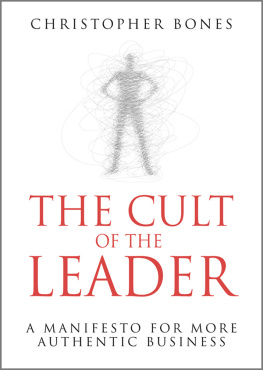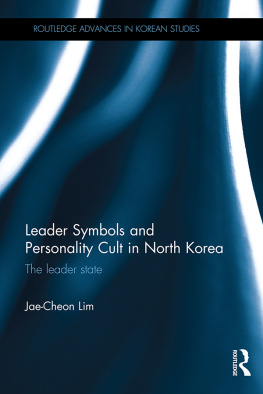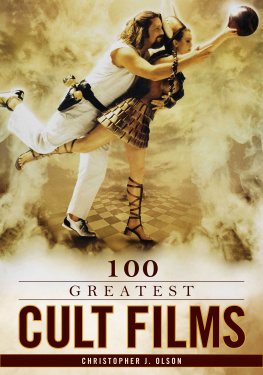Christopher Bones - The Cult of the Leader
Here you can read online Christopher Bones - The Cult of the Leader full text of the book (entire story) in english for free. Download pdf and epub, get meaning, cover and reviews about this ebook. year: 2012, publisher: Wiley, genre: Business. Description of the work, (preface) as well as reviews are available. Best literature library LitArk.com created for fans of good reading and offers a wide selection of genres:
Romance novel
Science fiction
Adventure
Detective
Science
History
Home and family
Prose
Art
Politics
Computer
Non-fiction
Religion
Business
Children
Humor
Choose a favorite category and find really read worthwhile books. Enjoy immersion in the world of imagination, feel the emotions of the characters or learn something new for yourself, make an fascinating discovery.
- Book:The Cult of the Leader
- Author:
- Publisher:Wiley
- Genre:
- Year:2012
- Rating:3 / 5
- Favourites:Add to favourites
- Your mark:
- 60
- 1
- 2
- 3
- 4
- 5
The Cult of the Leader: summary, description and annotation
We offer to read an annotation, description, summary or preface (depends on what the author of the book "The Cult of the Leader" wrote himself). If you haven't found the necessary information about the book — write in the comments, we will try to find it.
The Cult of the Leader — read online for free the complete book (whole text) full work
Below is the text of the book, divided by pages. System saving the place of the last page read, allows you to conveniently read the book "The Cult of the Leader" online for free, without having to search again every time where you left off. Put a bookmark, and you can go to the page where you finished reading at any time.
Font size:
Interval:
Bookmark:

This edition first published 2011
2011 Christopher Bones
Registered office
John Wiley & Sons Ltd, The Atrium, Southern Gate, Chichester, West Sussex, PO19 8SQ, United Kingdom
Under the Jossey-Bass imprint, Jossey-Bass, 989 Market Street, San Francisco CA 94103-1741, USA
www.jossey-bass.com
For details of our global editorial offices, for customer services and for information about how to apply for permission to reuse the copyright material in this book please see our website at www.wiley.com.
The right of the author to be identified as the author of this work has been asserted in accordance with the Copyright, Designs and Patents Act 1988.
All rights reserved. No part of this publication may be reproduced, stored in a retrieval system, or transmitted, in any form or by any means, electronic, mechanical, photocopying, recording or otherwise, except as permitted by the UK Copyright, Designs and Patents Act 1988, without the prior permission of the publisher.
Wiley also publishes its books in a variety of electronic formats. Some content that appears in print may not be available in electronic books.
Designations used by companies to distinguish their products are often claimed as trademarks. All brand names and product names used in this book are trade names, service marks, trademarks or registered trademarks of their respective owners. The publisher is not associated with any product or vendor mentioned in this book. This publication is designed to provide accurate and authoritative information in regard to the subject matter covered. It is sold on the understanding that the publisher is not engaged in rendering professional services. If professional advice or other expert assistance is required, the services of a competent professional should be sought.
ISBN 978-0-470-66604-3
ISBN 978-1-119-99111-3 (epdf)
ISBN 978-1-119-97804-6 (epub)
ISBN 978-1-119-97805-3 (mobi)
A catalogue record for this book is available from the British Library.
For Hamish and Sophie
Acknowledgements
There are many people who have contributed to the development of the ideas in this book and whose thinking has shaped and directed my own when I began to reflect on the state of leadership in modern organizations. In particular I would like to thank my colleagues at Henley Business School, and especially Professor Malcolm Higgs, Professor Stephen Lee, Dr Kevin Money, the Director of the John Madejski Centre for Reputation and Phil Radcliff who so successfully leads the Henley Leadership Programme. This book sprang from an original article for The Economist.com which created a worldwide debate about modern leaders and I would like to thank Conrad Heine, the Management Editor of The Economist for giving me that opportunity to share my views. Considerable credit for the finished product goes to Ellen Hallsworth at John Wiley & Sons who has been a diligent, thoughtful and supportive editor, always ready to give feedback and advice, understanding of all the aspects of being a business school Dean that got in the way of completion, but never letting up on her determination to ensure the book appeared. Finally I have to thank my wife, Gail, who endured the travails of writing, editing and all the associated frustrations by being an editor, proof reader and as always a great support.
Chris Bones
January 2011
Introduction: The Gods that Failed
If ever we needed great leadership in the world, then this must be the time that it should come forward and so far the 21st century hasnt really delivered. The global financial crisis, the failure of the worlds governments to agree a plan to mitigate our changing climate, the stalemate in the Middle East peace process, the stalling of the Darfur round and the continuing failure to reverse the rise of religious and political fundamentalism have all been ascribed in the media, in books and by polemicists of all persuasions to a common factor: a failure of leadership.
Good leaders would not let these things happen. The weak ones in key positions have, by their actions or inactivity (take your pick), been the authors not just of their own misery but, more importantly, of the conglomeration of crises that we now face. This is to be expected: in adversity we all look for someone to blame and rarely do we look to ourselves. We look to those who we believe have led us into the problem we now face.
The failure of leadership, and the doling out of blame in the aftermath, has had far-reaching consequences. Trust and confidence has bottomed out, not only in the current leaders of business, government, public services, but also in these systems and structures themselves; the systems and structures which have underpinned the way we live for the past fifty or sixty years. In the West, these systems and structures were based on three tenets. The first was that economic growth, measured through increases in gross domestic product was a good thing per se. The second, that consumption of scarce resources to satisfy the end consumer was the single most important outcome for all producers of economic activity be they firms or governments. Thirdly and more recently, that wealth could be better created through short-term changes in asset values rather than through the creation of goods and services that could be sold for a value greater than the cost of their delivery.
The result has been that, in the 21st century the wealthy have so much disposable income that they are able to consume to no real purpose apart from the purpose of consumption itself. The following diagrams (Figure
The average percentage change in real net household income in Great Britain 1997/82007/8
(reproduced by permission of The Poverty Site)
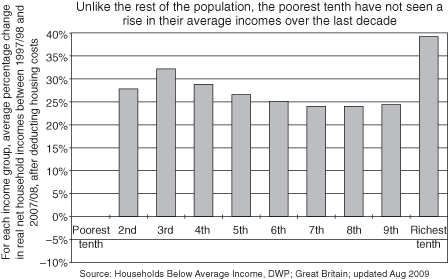
The difference in income growth between households in Great Britain 1997/82007/8
(reproduced by permission of The Poverty Site)
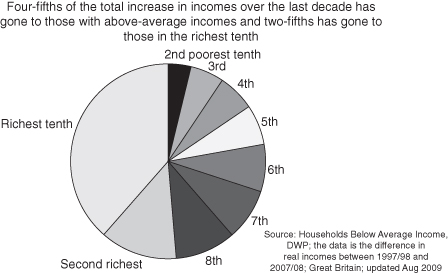
The behaviour and spending patterns of the wealthiest have in themselves become an aspiration for those far less wealthy. Such aspiration was spurred on by political leaders from Reagan and Thatcher to Bush and Blair, who created visions of a property-owning democracy where everyone could own their own home. In this brave new world, the fact of such ownership could make money in itself that could then be spent on furthering their ambitions to ape the lives of celebrities through even more consumption. To fuel these aspirations, business teamed up with the banks to exploit the deregulation of financial services in much of Europe and North America. Easy credit fuelled the emergence of something called a lifestyle.
Originally said to be a sociological term coined by Alfred Adler in the 1920s, it is now in common parlance and will in my view become the term that defines the generation for whom consumption became a way of life. Where shopping became a pastime rather than a chore and where those with more money than sense were able to spend on themselves just because they were worth it. This is the LOreal generation.
Their leaders were the epitomes of lifestyle. They looked the part, wore the clothes, lived in the houses, drove the cars, invested in the second homes, flashed the credit cards and plenty of them. They ate in the restaurants, espoused the politics of change, had the cosmetic enhancements and lived their lives of instant gratification. These were the modern pantheon of gods. The gods of capital (exemplified by Sir Fred Goodwin, Kenneth D. Lewis, Lloyd Blankfien amongst others) and the gods of economics (just think of Alan Greenspan, Ayn Rand and Milton Friedman as representing those who drove the pre 2008 orthodoxy). The gods of business (three who spring to mind are Kenneth Lay, WorldCom CEO, Stan ONeil of Merrill Lynch and Carly Fiorina of HP); the gods of style (we shouldnt forget Martha Stewart or Carole Caplin, or perhaps we should); and the gods of sport (what now for Tiger Woods, Joey Barton and Ben Johnson?). The gods of communication (the rivalries and global ambitions of Rupert Murdoch, Ted Turner and Conrad Black dominated for a decade) and the gods of the politics (Tony Blair, Bill Clinton and Silvio Berlusconi all brought celebrity to politics and took politics to new levels of public contempt) . This generations fascination with celebrity, and their wish to emulate the latest trend in every aspect of life, made these people international household names, whose every move was watched, reported on and copied. They intermingled (the reports on Tony Blairs and Gordon Browns guest lists for Chequers, show the intermingling of the political class with film stars, rock icons, billionaires, sports stars and the like) and created a coterie of self-reinforcing role models who met and glittered on a carousel of country houses, yachts, palaces, palazzos, ranches and the occasional dacha.
Font size:
Interval:
Bookmark:
Similar books «The Cult of the Leader»
Look at similar books to The Cult of the Leader. We have selected literature similar in name and meaning in the hope of providing readers with more options to find new, interesting, not yet read works.
Discussion, reviews of the book The Cult of the Leader and just readers' own opinions. Leave your comments, write what you think about the work, its meaning or the main characters. Specify what exactly you liked and what you didn't like, and why you think so.

